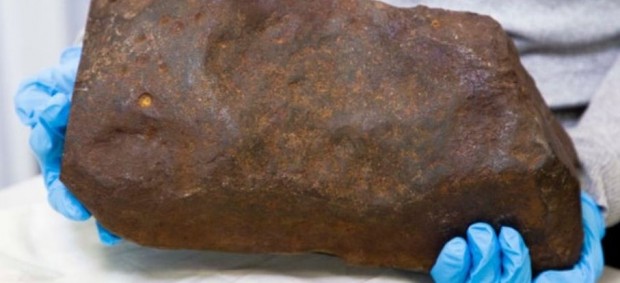
© |
David Hall won gold in 2015 at Maryborough Regional Park near Melbourne, Australia. Armed with a metal detector, he found something unusual – a very heavy, reddish rock lying on yellow clay.
He takes it home, tries his best to break it, and sure enough there’s a nugget of gold in the rock – after all, Maryborough is in the goldfields region, where the Australian gold rush reached its peak in the 19th century. To break down his discovery, Hole experimented with a rock saw, an angle grinder, a drill, and doused it in acid. However, even a hammer fails to make a crack. hicomm.bg writes, because it is not a question of native gold.
Years later, it is a rare meteorite.
“It had this sculptural shape,” Melbourne Museum geologist Dermot Henry told the Sydney Morning Herald.
Unable to open the “rock,” but still intrigued, Hole took the nugget to the Melbourne Museum for identification, Henry says, after 37 years working at the museum and examining thousands of rocks. Be real meteorites.
It was one of two.
Researchers have published a scientific paper describing a 4.6-billion-year-old meteorite, which they named Maryborough after the town where it was found. It weighs 17 kilograms, and using a diamond saw to cut a small piece, they found it contained a high percentage of iron, making it a typical H5 chondrite.
Once opened, you can also see tiny crystallized droplets of metallic minerals in it called chondrules.
“Meteors provide the cheapest form of space exploration. They take us back in time, providing clues about the age, formation and chemistry of our solar system, including Earth,” Henry continues. . Some meteorites contain ‘stardust’ older than our solar system, showing how stars formed and evolved to create the elements on the periodic table.
“Other rare meteorites contain organic molecules, such as amino acids, which are the building blocks of life.”
Although researchers still don’t know where the meteorite came from or how long it stayed on Earth, they have some guesses.
Our solar system was once a swirling pile of dust and chondrite rock. Gravity eventually clumps these objects together into planets, but they most likely end up in a large asteroid belt. This particular meteorite most likely came out of the asteroid belt between Mars and Jupiter, where some of the asteroids collided with each other and then one day fell to Earth.
Carbon dating indicates that the meteorite was on Earth 100 to 1000 years ago, and there were several meteorites between 1889 and 1951 that could coincide with their arrival on our planet.
Researchers say the Maryborough meteorite is rarer than gold and is extremely valuable to science. It is one of the few meteorites ever recorded in the Australian state of Victoria and is the second largest chondrite mass after a larger 55 kg specimen found in 2003. This is the 17th meteorite found in Victoria, out of thousands that have been found. Gold nuggets were found.

Prone to fits of apathy. Unable to type with boxing gloves on. Internet advocate. Avid travel enthusiast. Entrepreneur. Music expert.



